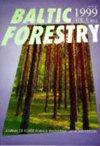社交媒体是社会传播和森林教育的机会还是死胡同波兰经验
IF 0.6
4区 农林科学
Q3 FORESTRY
引用次数: 0
摘要
这篇文章描述了在社交媒体上发展森林教育的经验、问题和前景,过去几年,波兰国家森林控股公司“国家森林”在社交媒体中开展了森林教育。森林工作者(拥有大学学位的州立森林雇员)在社交媒体上的活动允许与公众接触,即向广大受众传播有关森林的知识,对困难的讨论做出快速反应,经常攻击森林工作者在公共场所进行的森林管理。此外,社交媒体在科学家和公众之间的交流,甚至在科学合作(所谓的公民科学;全部或部分由业余科学家进行的科学研究)方面具有巨大潜力。由于在社交媒体这一有吸引力的领域进行了培训,林业工作者的热情和经验每年都在增加州立森林的社交媒体受众,所有这些都转化为需要评估和监测被动教育方法的数据。关键词:社交媒体、森林教育、非正规教育、环境教育、社会沟通、冲突、公民科学、林业工作者本文章由计算机程序翻译,如有差异,请以英文原文为准。
Social media as an opportunity or a blind alley in social communication and forest education? – Experiences from Poland
The article characterizes the experiences, problems, and prospects for the development of forest education on social media, which in Poland has been carried out by the Państwowe Gospodarstwo Leśne Lasy Państwowe (National Forest Holding ‘State Forests’) over the past several years. The activity of foresters (employees of the State Forests with a University Degree) on social media allows contact with the public, i.e. the transmission of knowledge about forests to a wide audience, a rapid response to difficult discussions, often attacking foresters about forest management taking place in public spaces. In addition, social media has great potential for communication between scientists and the public, and even for scientific collaboration (so-called citizen science; scientific research conducted, in whole or in part, by amateur scientists). As a result of training in this attractive area of social media, the passion and experience of foresters is increasing the audience on social media for State Forests every year, all of which translates into the need for evaluating and monitoring the data from passive educational methods. Keywords: social media, forest education, informal education, environmental education, social communication, conflicts, citizen science, foresters
求助全文
通过发布文献求助,成功后即可免费获取论文全文。
去求助
来源期刊

Baltic Forestry
农林科学-林学
CiteScore
1.60
自引率
0.00%
发文量
23
审稿时长
>12 weeks
期刊介绍:
The journal welcomes the original articles as well as short reports, review papers on forestry and forest science throughout the Baltic Sea region and elsewhere in the area of boreal and temperate forests. The Baltic Sea region is rather unique through its intrinsic environment and distinguished geographical and social conditions. A temperate climate, transitional and continental, has influenced formation of the mixed coniferous and deciduous stands of high productivity and biological diversity. The forest science has been affected by the ideas from both the East and West.
In 1995, Forest Research Institutes and Universities from Estonia, Latvia and Lithuania
joined their efforts to publish BALTIC FORESTRY.
 求助内容:
求助内容: 应助结果提醒方式:
应助结果提醒方式:


